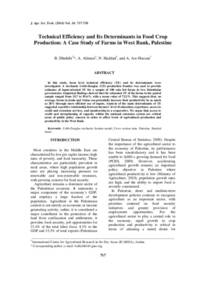Technical Efficiency and Its Determinants in Food Crop Production: A Case Study of Farms in West Bank, Palestine

Authors:
In this study, farm level technical efficiency (TE) and its determinants were
investigated. A stochastic Cobb-Douglas (CD) production frontier was used to provide
estimates of input-oriented TE for a sample of 100 rain fed farms in two Palestinian
governorates. Empirical findings showed that the estimated TE of the farms in the pooled
sample ranged from 35.7 to 95.6%, with a mean value of 72.2%. This suggests that, on
average, farms in Jenin and Tubas can potentially increase their productivity by as much
as 28% through more efficient use of inputs. Analysis of the main determinants of TE
suggested a positive relationship between farmers’ level of education, experience, access to
credit and extension services, and membership in a cooperative. We argue that access to
credit and strengthening of capacity within the national extension system are critical
areas of public policy concern in order to affect levels of agricultural production and
productivity in the West Bank.
